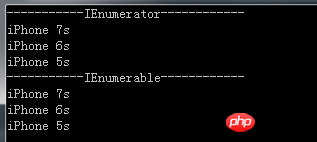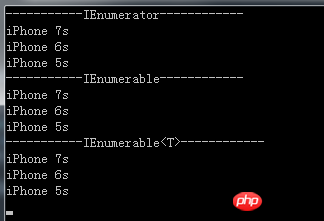 Backend Development
Backend Development
 C#.Net Tutorial
C#.Net Tutorial
 A brief introduction to the C# IEnumerable and IEnumerator interfaces
A brief introduction to the C# IEnumerable and IEnumerator interfaces
A brief introduction to the C# IEnumerable and IEnumerator interfaces
This article mainly introduces the relevant knowledge of the IEnumerable and IEnumerator interfaces in C#, which has a very good reference value. Let’s take a look at it with the editor.
Review the past and learn the new. You can be a teacher. It is necessary to review basic knowledge frequently when you have time, and it can deepen your understanding and memory.
Foreach is often used to iterate through collections and traverse containers that implement the IEnumerable interface. I am sometimes a little confused about the IEnumerable and IEnumerator interfaces. According to the official explanation, IEnumerable is an enumerator interface, and IEnumerator is an iterator. The interfaces are not very different from the literal meaning. Let’s analyze them one by one.
IEnumerable interface
public interface IEnumerable
{
IEnumerator GetEnumerator();
}Classes that inherit IEnumerable interface need to implement the exposed GetEnumerator() method and return an IEnumerator interface object, see It is IEnumerator that really does the work. F12 to see what the heck there is in IEnumerator.
IEnumerator interface
public interface IEnumerator
{
object Current { get; }
bool MoveNext();
void Reset();
}IEnumerator interface has three things, one attributeCurrent, returns the elements in the current collection, and the method MoveNext() moves Going to the next one, isn't traversal all backward traversal? Reset() literally means reset. This is easy to understand. Make a hypothesis: Since the IEnumerable interface returns an IEnumerator interface iterator, can a custom container be implemented by only inheriting the IEnumerator iterator interface?
Define a Phone class
public class Phone
{
public string Name;
public Phone(string name)
{
this.Name = name;
}
}Define an iterator named MyEnumerator and implement its interface IEnumerator
public class MyEnumerator : IEnumerator
{
Phone[] p;
int idx = -1;
public MyEnumerator(Phone[] t)
{
p = t;
}
public object Current
{
get
{
if (idx == -1)
return new IndexOutOfRangeException();
return p[idx];
}
}
public bool MoveNext()
{
idx++;
return p.Length > idx;
}
public void Reset()
{
idx = -1;
}
}class Program
{
static void Main(string[] args)
{
show("-----------IEnumerator------------");
Phone[] phones = new Phone[] { new Phone("iPhone 7s"), new Phone("iPhone 6s"), new Phone("iPhone 5s") };
MyEnumerator enumerator = new MyEnumerator(phones);
while (enumerator.MoveNext())
{
Phone p = enumerator.Current as Phone;
show(p.Name);
}
Console.ReadKey();
}
static void show(string i)
{
Console.WriteLine(i);
}
}The results show:

As expected, what really does the work is the IEnumerator interface, which can loop through a custom container. However, the original intention is I want to use Foreach for loop access and traversal. Well, then we can only display the IEnumerable interface to do it. Slightly transform the Phone class:
public class Phone : IEnumerable
{
public string Name ;
public Phone(string name)
{
this.Name = name;
}
Phone[] p;
public Phone(Phone[] t)
{
p = t;
}
public IEnumerator GetEnumerator()
{
return new MyEnumerator(p);
}
}static void Main(string[] args)
{
show("-----------IEnumerator------------");
Phone[] phones = new Phone[] { new Phone("iPhone 7s"), new Phone("iPhone 6s"), new Phone("iPhone 5s") };
MyEnumerator enumerator = new MyEnumerator(phones);
while (enumerator.MoveNext())
{
Phone p = enumerator.Current as Phone;
show(p.Name);
}
show("-----------IEnumerable------------");
Phone phoneList = new Phone(phones);
foreach (Phone p in phoneList)
{
show(p.Name);
}
Console.ReadKey();
}The result shows:

Done, then expand it into a universal container PhonePackage, inherit the generic The IEnumerable
public class PhonePackage<T> : IEnumerable<T>
{
private List<T> dataList = null;
public void Add(T t)
{
if (dataList == null)
dataList = new List<T>();
dataList.Add(t);
}
public IEnumerator<T> GetEnumerator()
{
foreach (T t in dataList)
{
yield return t;
}
}
IEnumerator IEnumerable.GetEnumerator()
{
foreach (T t in dataList)
{
yield return t;
}
}
}static void Main(string[] args)
{
show("-----------IEnumerator------------");
Phone[] phones = new Phone[] { new Phone("iPhone 7s"), new Phone("iPhone 6s"), new Phone("iPhone 5s") };
MyEnumerator enumerator = new MyEnumerator(phones);
while (enumerator.MoveNext())
{
Phone p = enumerator.Current as Phone;
show(p.Name);
}
show("-----------IEnumerable------------");
Phone phoneList = new Phone(phones);
foreach (Phone p in phoneList)
{
show(p.Name);
}
show("-----------IEnumerable<T>------------");
PhonePackage<Phone> phonePackage = new PhonePackage<Phone>();
phonePackage.Add(new Phone("iPhone 7s"));
phonePackage.Add(new Phone("iPhone 6s"));
phonePackage.Add(new Phone("iPhone 5s"));
foreach (Phone p in phonePackage)
{
show(p.Name);
}
Console.ReadKey();
}
static void show(string i)
{
Console.WriteLine(i);
}The results show:

#The IEnumerator iterator interface is quite verbose, and yield is just syntax sugar that simplifies traversal.
The above is the detailed content of A brief introduction to the C# IEnumerable and IEnumerator interfaces. For more information, please follow other related articles on the PHP Chinese website!

Hot AI Tools

Undresser.AI Undress
AI-powered app for creating realistic nude photos

AI Clothes Remover
Online AI tool for removing clothes from photos.

Undress AI Tool
Undress images for free

Clothoff.io
AI clothes remover

Video Face Swap
Swap faces in any video effortlessly with our completely free AI face swap tool!

Hot Article

Hot Tools

Notepad++7.3.1
Easy-to-use and free code editor

SublimeText3 Chinese version
Chinese version, very easy to use

Zend Studio 13.0.1
Powerful PHP integrated development environment

Dreamweaver CS6
Visual web development tools

SublimeText3 Mac version
God-level code editing software (SublimeText3)

Hot Topics
 1655
1655
 14
14
 1414
1414
 52
52
 1307
1307
 25
25
 1255
1255
 29
29
 1228
1228
 24
24
 Active Directory with C#
Sep 03, 2024 pm 03:33 PM
Active Directory with C#
Sep 03, 2024 pm 03:33 PM
Guide to Active Directory with C#. Here we discuss the introduction and how Active Directory works in C# along with the syntax and example.
 C# Serialization
Sep 03, 2024 pm 03:30 PM
C# Serialization
Sep 03, 2024 pm 03:30 PM
Guide to C# Serialization. Here we discuss the introduction, steps of C# serialization object, working, and example respectively.
 Random Number Generator in C#
Sep 03, 2024 pm 03:34 PM
Random Number Generator in C#
Sep 03, 2024 pm 03:34 PM
Guide to Random Number Generator in C#. Here we discuss how Random Number Generator work, concept of pseudo-random and secure numbers.
 C# Data Grid View
Sep 03, 2024 pm 03:32 PM
C# Data Grid View
Sep 03, 2024 pm 03:32 PM
Guide to C# Data Grid View. Here we discuss the examples of how a data grid view can be loaded and exported from the SQL database or an excel file.
 Factorial in C#
Sep 03, 2024 pm 03:34 PM
Factorial in C#
Sep 03, 2024 pm 03:34 PM
Guide to Factorial in C#. Here we discuss the introduction to factorial in c# along with different examples and code implementation.
 The difference between multithreading and asynchronous c#
Apr 03, 2025 pm 02:57 PM
The difference between multithreading and asynchronous c#
Apr 03, 2025 pm 02:57 PM
The difference between multithreading and asynchronous is that multithreading executes multiple threads at the same time, while asynchronously performs operations without blocking the current thread. Multithreading is used for compute-intensive tasks, while asynchronously is used for user interaction. The advantage of multi-threading is to improve computing performance, while the advantage of asynchronous is to not block UI threads. Choosing multithreading or asynchronous depends on the nature of the task: Computation-intensive tasks use multithreading, tasks that interact with external resources and need to keep UI responsiveness use asynchronous.
 Patterns in C#
Sep 03, 2024 pm 03:33 PM
Patterns in C#
Sep 03, 2024 pm 03:33 PM
Guide to Patterns in C#. Here we discuss the introduction and top 3 types of Patterns in C# along with its examples and code implementation.
 Prime Numbers in C#
Sep 03, 2024 pm 03:35 PM
Prime Numbers in C#
Sep 03, 2024 pm 03:35 PM
Guide to Prime Numbers in C#. Here we discuss the introduction and examples of prime numbers in c# along with code implementation.



